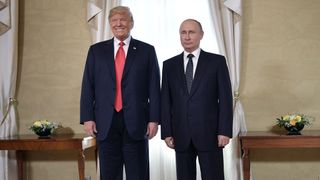Key points
- More than 20 per cent of Americans believe President Donald Trump will leave office before the 2020 US presidential election.
- Only 30 per cent believe Trump will win re-election in 2020.
- Nearly half of Americans believe there was cooperation between the Trump campaign and Russia. Of these, 94 per cent believe Trump will not get a second term.
In January 2017, the US Office of the Director of National Intelligence assessed that Russian President Vladimir Putin orchestrated a campaign designed to harm the electoral chances of Democratic candidate Hillary Clinton, faith in the US electoral system, and increase political instability in the United States.
Since Trump's inauguration, these questions over the extent of the contact between his campaign and Russian government agents has loomed over his presidency.
Although there is debate over the specific forms and extent of the direct contact between the Trump campaign and Russia, that it occurred and that elements of the campaign hoped it would benefit them during the 2016 US presidential election are now largely beyond dispute. To ascertain the rest, then-Deputy Attorney General Rod Rosenstein, a Trump appointee, established a Special Counsel in May 2017. He placed Robert Mueller in charge of the investigation, with a charter to determine if there was any Russian interference in the 2016 election process, or related matters, and prosecutorial powers.
In the nearly two years it has been running, the Mueller investigation has resulted in dozens of indictments for federal crimes and eight (publicly known) guilty pleas or convictions. In the process it has generated considerable media coverage and public interest.
To discover what Australians and Americans have taken from the process so far, and what they believe the likely near-term outcome for the US president will be, the United States Studies Centre (USSC) and YouGov polled 1,000 respondents in the United States and 1,029 in Australia in late January 2019.
Dr Shaun Ratcliff, lecturer in political science at the United States Studies Centre, said the USSC-YouGov poll had showed that public opinion about whether the Trump campaign had worked with agents of the Russian government to gain an advantage during the presidential election was a largely partisan affair in both Australia and the United States.
“Republicans in the United States and Coalition voters in Australia were less likely to believe the Trump campaign had worked with the Russians, while Democrats and Labor voters were generally more likely to accept this as fact," Dr Ratcliff said.
“Related to this, Democrats and to a lesser extent Labor voters were less likely to believe President Trump will make it to the next election, or if he does they overwhelmingly believe he will not win.
"It will be interesting to see if views change once Mueller, who is a Republican himself, finishes his investigation.”
Results
When and how will Donald Trump leave office?
Question: Donald Trump commenced a four-year term as president of the United States in January 2017. Trump is eligible to run for re-election in 2020 and serve a second four-year term starting in January 2021.
How and when will Donald Trump’s presidency end?
- Death, resignation or removal from office before the end of Trump’s current term.
- By losing the November 2020 presidential election.
- During or after a 2nd term as president (after winning re-election in 2020 election).
- Not sure
American and Australian opinions on how and when will Donald Trump’s presidency end
|
Response |
American voters |
Australian voters |
||||
|
|
Democratic voters (%) |
Republican voters (%) |
All voters (%) |
Labor voters (%) |
Coalition voters (%) |
All voters (%) |
|
Death, resignation or removal from office before the end of Trump’s current term |
46 |
3 |
23 |
26 |
17 |
21 |
|
By losing the November 2020 Presidential election |
44 |
8 |
29 |
47 |
40 |
41 |
|
During or after a 2nd term as president (after winning re-election in 2020 election) |
3 |
70 |
30 |
15 |
23 |
18 |
|
Not sure |
7 |
19 |
18 |
12 |
19 |
20 |
Key findings:
- Around half of all Australians believe Donald Trump will lose the 2020 election, or leave office early. Very few believe he will win the next election. Even among Coalition voters, fewer than 25 per cent believe he will win in 2020.
- In the United States, as is so often the case, responses are divided along partisan lines. Overall, our American respondents were relatively evenly split between the options that Trump would win or lose in 2020, leave office before the next election or were not sure.
- Approximately a third of our American respondents believe Donald Trump will lose the next election. A similar number believe he will win, while more than 20 per cent believe he will leave office early.
- Among Republicans only, less than 10 per cent believe Donald Trump will lose at the 2020 election and almost none believe he will leave office early.
- Democrats look like almost a mirror image of their partisan opponents. Around 90 per cent believed President Trump would either leave office early or lose at the 2020 election. Almost none believe he will win the next election.
Beliefs about Russian cooperation a partisan affair
Question: Do you believe that the campaign to elect Donald Trump president of the United States worked with the Russian government who were interfering in the 2016 US election?
- Yes
- No
- Not sure
American and Australian opinions on whether the Trump campaign worked with Russia
|
Response |
American voters |
Australian voters |
||||
|
|
Democratic voters (%) |
Republican voters (%) |
All voters (%) |
Labor voters (%) |
Coalition voters (%) |
All voters (%) |
|
Yes |
84 |
5 |
42 |
55 |
35 |
41 |
|
No |
4 |
87 |
38 |
18 |
32 |
23 |
|
Not sure |
13 |
7 |
20 |
27 |
33 |
36 |
Key findings:
- Nearly 90 per cent of Republicans reject the idea that the campaign to elect Donald Trump president of the United States worked with agents of the Russian government trying to interfere in the 2016 US presidential election. Conversely, more than 80 per cent of Democrats agree with it. Curiously, Democrats in our sample were slightly more likely to say they were not sure than Republicans.
- Overall, slightly more US voters accept that the Trump campaign collaborated with the Russian government in some way.
- A somewhat similar pattern was evident in Australia, although overall there was less certainty in either direction. Coalition voters were almost evenly split on this question. Roughly a third agreed the Trump campaign had worked with the Russians, a third did not and another third were not sure. Conversely, just over half of Labor voters agreed their had been some kind of cooperation between the campaign and the Russians, while less than 20 per cent believed there had been none.
The proportion of Americans who think Trump will not make it to a second term, conditional on whether they believe his campaign colluded with Russia
|
|
Did not work with Russia |
Worked with Russia |
Difference |
|
Democratic |
76 |
98 |
22 |
|
Republican |
9 |
78 |
69 |
|
All Americans |
16 |
94 |
79 |
The proportion of Australians who think Trump will not make it to a second term, conditional on whether they believe his campaign colluded with Russia
|
|
Did not work with Russia |
Worked with Russia |
Difference |
|
Labor |
66 |
86 |
20 |
|
Coalition |
52 |
83 |
31 |
|
All Australians |
54 |
85 |
31 |
Those who believe the Trump campaign worked with the Russians were more likely to say that Trump would not finish his term or win re-election in 2020. Among Democrats, belief in Trump-Russia contact was associated with a much higher rate in the belief Trump would not remain in office until the end of his term; but even among (the small number of) Republicans who believe the Trump campaign worked with Russia, this pattern was evident.
Vote intention
Vote intention for the House of Representatives if a US congressional election were held in late January, 2019
|
Intention |
Voters (%) |
|
Democratic |
37 |
|
Republican |
31 |
|
Libertarian |
3 |
|
Greens |
2 |
|
Cannot vote |
19 |
|
Will not vote |
8 |
Vote intention for the House of Representatives if an Australian election were held in late January, 2019
|
Intention |
Voters (%) |
|
Labor |
31 |
|
Coalition |
26 |
|
Greens |
8 |
|
Other |
7 |
|
One Nation |
3 |
|
Cannot vote |
19 |
|
Will not vote |
5 |
Survey details
Responses were weighted by YouGov to ensure samples representive of the Australian and American populations. The Australian sample was weighted by age, gender, education, region (crossed with city, non-city) and vote at the 2016 Australian federal election. The US sample was weighted by age, gender, race, education, region, voter registration, and vote choice in the 2012 and 2016 presidential elections.
The margin of error is approximately ± 3 percentage points for results reported for the full sample of both the Australian and American surveys. It is larger for sub-groups of the full samples and for differences between the countries.
Background to the USSC-YouGov poll
In September 2017, the United States Studies Centre announced that it had partnered with global survey company YouGov, which now provides the Centre with exclusive, monthly polling data from the United States and Australia; tracking perceptions of political leadership in both countries, and unique, targeted insights on a diverse range of topics.
CEO of the United States Studies Centre Professor Simon Jackman, a leader in public opinion research, has previously worked as one of the principal investigators of the American National Election Studies and partnered with media outlets including the Guardian Australia and the Huffington Post on pre-election polling. He said the results provided by YouGov as part of the new partnership will allow the Centre to analyse and publish unprecedented comparative data.
“The United States Studies Centre has taken a keen interest in the attitudes and opinions of people in our region, with research like our surveys into America’s role in the Indo-Pacific. This exciting new partnership with YouGov gives us the opportunity to broaden that focus to public opinion in the United States and then contrast that with the views of people in our own backyard,” Jackman said. “The Centre has a mandate to deepen Australia’s understanding of America. This ongoing commitment to charting public perceptions in both countries is an ideal way for Australians to gain perspective on the United States.”
YouGov is a market research and opinion polling company headquartered in the United Kingdom, with operations in Europe, North America, the Middle East and the Asia-Pacific.The proportion of Americans who think Trump will not make it to a second term, conditional on whether they believe his campaign colluded with RussiaThe proportion of Americans who think Trump will not make it to a second term, conditional on whether they believe his campaign colluded with Russia
The proportion of Americans who think Trump will not make it to a second term, conditional on whether they believe his campaign colluded with Russia






